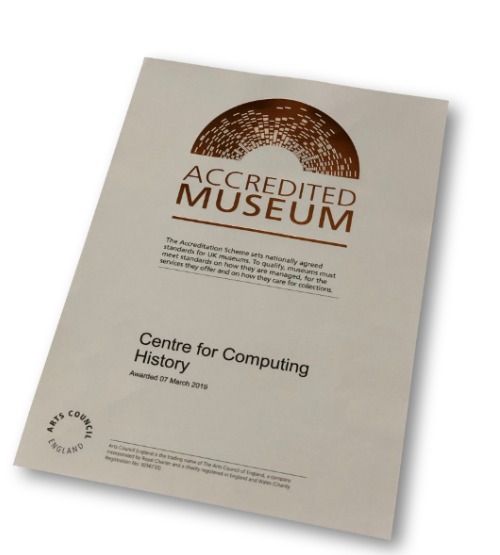The Centre for Computing History Awarded Accredited Museum Status
|
On the 7th March, the Centre for Computing History was awarded 'Full Accreditation' status by the UK Arts Council.
The Accreditation Scheme sets out nationally-agreed standards, which inspire the confidence of the public and funding and governing bodies. It enables museums to assess their current performance, as well as supporting them to plan and develop their services.
 This is the culmination of 3 years of hard work in implementing documented cataloguing systems, preservation processes, development plans and working procedures, demonstrating that the organisation works to a high standard both in our preservation efforts and as a visitor attraction. This is the culmination of 3 years of hard work in implementing documented cataloguing systems, preservation processes, development plans and working procedures, demonstrating that the organisation works to a high standard both in our preservation efforts and as a visitor attraction.CEO for the Centre for Computing History, Jason Fitzpatrick, said
The recent Heritage Lottery funded project to bring together, preserve, archive and digitise a range of LEO Computers artefacts and documents, further cements the museum as a serious player in preservation and dissemination of computing history.
An ongoing and developing area of the museums work is the understanding of the chemical make-up of component materials used in computers. Plastics break down relatively quickly, sometimes seen as 'yellowing', where the colour of the plastic goes yellow over time. There is also the interaction of different types of plastics when in contact with each other. Known as 'cable burn', certain PVC sleeved cables will, under the right condition, 'melt' the ABS plastic that it is in contact with. At the same time some plastics will generate harmful gasses that can negatively affect other materials. Another problem area is batteries. Many vintage computers have internal batteries that store configuration information. Some will 'leak' over time causing harmful acids to damage the surround electronic circuits, so the museum is making a concerted effort to remove them and protect the machine from potential harm.
The museum is on the front line when it comes to implementing working practices for these types of materials and is looking to further it's knowledge by working with other institutions. Museums Accreditation is not all about preservation. It is also very much about the organisation itself and being a visitor attraction. A large section of the documentation is about the structure of the organisation and our day to day working practices. Overwhelming positive feedback from our visitors helped very much in this respect.
To finish Jason added
 --- ENDS
Notes to editors:
Centre for Computing History
Established in 2006, the Centre for Computing History is a charitable heritage organisation with a strong focus on learning. Since opening in Cambridge in August 2013, the Centre has helped people understand how tech has shaped the modern world and revolutionised the way we live, work and play through interactive displays and exhibitions, our schools programme, learning events and workshops, and an astonishing collection of computers old and new. Visit www.computinghistory.org.uk. Follow @computermuseum
For further information or images, please contact: Jason Fitzpatrick (jason@computinghistory.org.uk, 01223 214446). Date : 07-03-2019 |









